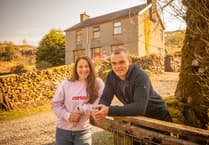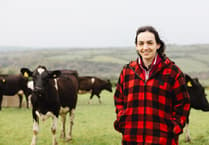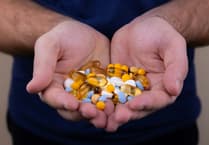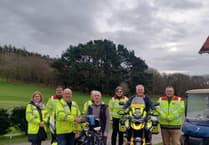A TEIFI Valley family have allowed cameras to follow their daily lives to give a ‘warts and all’ account of family farm life.
“We were very willing to let cameras follow us on the farm for a year, but we were also keen to convey real life - the reality, warts and all - not just the best bits, because that’s not what reality is,” said Meinir Howells, one of the Ffermio presenters and her husband Gary, as they set about recording a year of life on their farm, Shadog in a special series of Ffermio, Teulu Shadog: Blwyddyn ar y Fferm. The final programme of the series of four ends this week (Monday, 24 January) as a big day arrives for the family – the sale of the rams from the farmyard for the second time this year. And as they say goodbye to the rams, Gary and Meinir travel all the way to Scotland to buy cattle and start a new venture.
Life is busy for Meinir, from presenting, being a mother to two children - Sioned who is 5, and Dafydd who is 3 - as well as running the 450-acre farm at Pentrecwrt near Llandysul with Gary.
“Showing the juggle was important - we’re a young couple and we have a young family; it can be very difficult at times. When you’re busy in the middle of lambing season, for example, you can feel that the children are losing out - we can’t take them to nice places because everyone is busy on the farm. They’re often dragged along with us to fetch sheep in. We’re truly a family farm.”
But no matter how busy day-to-day life is on this family farm, one thing that has become clear in the series is the emphasis the couple places on the importance of moving with the times. In the final programme, Shadog undergoes a major change as they venture and buy Aberdeen Angus cattle from Scotland.
“This is the first time we’ve had an Aberdeen Angus herd here,” said Meinir, “so, above all, it changes the farm’s path to meet the carbon footprint requirements, because you have to change with the times and try new things. We think the Aberdeen Angus is a good solution to that issue because hopefully they will be able to fatten off grass more easily. Their carbon footprint will be smaller because they will hopefully be more efficient. They will be able to live outside hard.” In retrospect, what was it like then to have a film crew following every day’s movement, sometimes in challenging times? Meinir says: “I felt like the crew - the camera and sound man - were like a close family by the end. It was difficult at first for me not to look and talk to the camera. It’s easier to go to someone else’s farm - just turn up, you don’t have to worry about mess and the problems that arise in the morning!”





Comments
This article has no comments yet. Be the first to leave a comment.